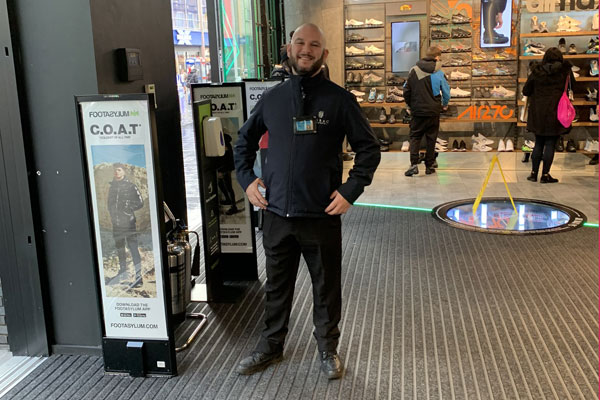
Violence and abuse aimed at public-facing staff is sadly a significant issue in the retail sector – and it's been on the rise since the start of the COVID-19 pandemic.
A survey by the Union of Shop, Distributive and Allied Workers (Usdaw) found the average retail worker had been threatened, assaulted or abused once every 6.5 days during the first lockdown in 2020.
The Co-op was one of the retailers reporting a steep increase in cases of staff abuse. During the first week that facemasks became compulsory in shops, the Co-op reported almost a thousand incidents across its 2,500 UK stores.
And Cobac's own incident reporting data from retail stores across the UK showed a 72% increase in aggression, threats and violence, compared to the pre-COVID baseline.
In an ideal world, staff should never need to deal with abuse and assault. Unfortunately, we don’t live in an ideal world, and many businesses are forced to regularly deal with incidents.
With that in mind, here are a few ways to help your business and employees cope with confrontational customers before incidents escalate:
1. Be prepared
With antisocial behaviour and confrontations on the rise in retail settings, it pays to have a plan in place so that staff know what to do if an incident occurs.
Many businesses place staff at the front of the store to fulfil a range of roles, such as managing the number of people inside the building or directing customers to one-way systems or in-store changes.
If employees are required to enforce mask wearing in your stores, these staff are highly likely to deal with aggression from customers who refuse.
Experienced security support is available to fulfil this role, with officers who are trained to deal with aggressive situations. But if you own staff undertake this role, make sure they understand what they're expected to do and what the next steps should be if someone refuses to comply.
- Do they have answers to common questions or arguments?
- Where are their nearest colleagues and how do they quickly get support if required?
- Is a colleague within their eyeline or do they require radio contact?
- Where is the ‘line’ when they know it’s time to ask for help?
The more that's known beforehand – and the less that's left for a staff member to figure out or decide in the moment – the safer the situation is likely to be.

2. Know the warning signs
Before a situation escalates to shouting, direct threats - and even physical violence - there are often more subtle signs to show a customer is feeling on edge or increasingly agitated.
Staff can keep an eye out for clues such as clenched fists, tense body language, heavy breathing and a flushed face as possible signs that a customer might be growing frustrated. More obvious signs like a raised voice or getting within an employees’ personal space can demonstrate an escalating situation.
Of course, spotting these signs alone won’t resolve the situation. But they can act as a heads-up for staff to be on their guard and attempt to calm the customer down if it’s safe to do so.

3. Remain calm and actively listen
Tempers on all sides are frayed after so many months of restrictions and lockdowns, and it can feel almost impossible to stay calm when faced with an angry customer. But if an employee can keep their cool and remain calm and firm, this offers the best chance of de-escalating the situation and preventing it from getting worse.
Some people just need to feel their frustration has been heard in order to feel better – and this is where active listening comes in.
Staff can help an agitated customer to feel heard and understood by:
- Using body language and verbal cues to show they’re listening – eg ‘uh-huh’, ‘I see’. They can use this sort of non-committal language without having to agree with what the customer is saying.
- Paraphrasing what’s been said back to the customer – eg ‘it sounds like you’re saying…’
- Asking further questions to clarify a point
Drawing the customer into this type of conversation may diffuse the situation, but if an employee feels at risk they should always get themselves support as a priority – rather than engaging further with an irate customer.
Note that remaining calm and actively listening doesn’t mean being a pushover or giving in to the customer’s demands. A staff member can listen whilst still remaining firm on the company’s policies. These tactics are all about an employee keeping their cool, as responding with frustration or aggression can flare up the situation and make it more likely to end in violence.

4. Don’t get physically involved
Speaking of violence, staff should never intervene physically or attempt restraint in a situation when they haven’t been trained how to do so safely.
As before, make sure your team members know how and when to call for assistance if they’re faced with a situation which shows signs of escalating.
Initially this may be support from other colleagues in the premises or security personnel nearby, whilst the police may need to be involved if a situation turns violent and staff or other customers are at risk.

5. Call in the professionals
To help keep your staff and customers safe, professional security solutions can be used on a temporary or permanent basis, either as outsourced security or to support your in-house teams.
Uniformed security officers are one of the most recognisable solutions. These officers are highly trained in how to deal with confrontation. If that isn't possible, they know how to respond appropriately to keep staff and other customers safe.
Research has shown that simply the presence of uniformed officers on-site can reduce the chances of a crime taking place. It also allows for an immediate response to incidents by specially trained staff and a greater opportunity of diffusing a volatile situation.
For smaller, independent businesses or small branches of larger companies, technology such as CCTV or body-worn cameras can serve as a deterrent to violence. Clustered security guarding can also be set-up to respond to high-risk locations or incidents.
At Cobac Security, we specialise in providing flexible, bespoke security personnel services to a wide variety of sectors – including retail, logistics, hospitality, residential and leisure services.
Our staff are equipped with technology which allows for live incident reporting and escalation, as well as modelling the risk and customer behaviours at your location – allowing for an effective risk assessment and security solution to be designed to suit your business.
To discuss how we can help keep your staff, customers, assets and premises safe, get in touch via information@cobacsecurity.co.uk or call +44 (0)1332 948320.
